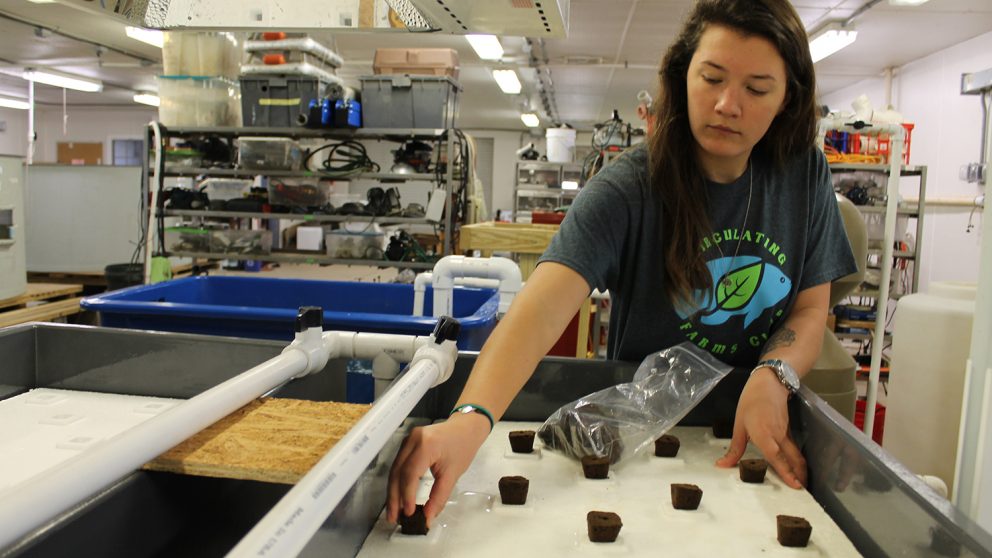As Maddie Ciszewski has prepared for a career that brings together her passion for agriculture and for people, she’s been at the forefront of student-led efforts to help others learn more about aquaponics.
The emerging industry combines fish farming with cultivating plants in water that contains nutrients from fish waste. Aquaponics holds promise, Ciszewski says, in increasing plant and protein production to help feed a growing world population.
On Dec. 15, when she graduates from NC State, Ciszewski will hand over the reins of the university’s Recirculating Farms Club, a group she helped start as a freshman in the university’s Life Sciences First Year (LSFY) program.
Like many of the students in the LSFY, Ciszewski knew she wanted to study science, but she didn’t know which scientific field she wanted to pursue. Here, she talks about how she came to major in agricultural sciences, with concentrations in both soil and animal science, and about how her experience with aquaponics helped her build valuable career skills.

How did you end up at NC State and the College of Agriculture and Life Sciences?
I grew up in Washington, D.C., but I always had my hands in the dirt. My mom had a garden at our house and a big community plot where we grew a lot of produce, so I was always interested in horticulture and plants. While I was searching for colleges, I didn’t know exactly what I wanted to do, but I knew I wanted to go into the sciences. I applied, got in and came for a visit to State and loved it.
Why did you choose agricultural sciences?
In my freshman year, I ended up getting connected to aquaponics by the teaching assistant (Paul Begue) in my BIO 181 lab. I knew then that agriculture is what I wanted to do.
My brother works on small farms out west. I learned about small-scale agriculture from him, and that perspective sparked my interest in bringing the principles of sustainability to agriculture.
NC State was the outlet to do that because agriculture is important to the state. While I didn’t have the experience in big agriculture that some students had, my perspective for the smaller-scale things has played to my favor. I’ve seen a lot of how agriculture can benefit people in cities and smaller communities.
How did you get involved in aquaponics?
It started with the BIO 181 lab. Paul was looking for labor for his lab out on Lake Wheeler Road, and so he had me and a couple of other students to help. Dr. Harry Daniels, who is a professor in the applied ecology department, runs the lab out there and he’d been out there doing research on flounder and bass for a long while. They were trying to bring in the full picture of aquaponics. They had the fish tanks, and we helped them build beds to grow the crops in.
I spent most of freshman and part of sophomore year helping build and maintain the system. From there, Paul wanted to bring more students out to the lab and have more student involvement with the Recirculating Farms Club. We won a grant from the sustainability fund — actually two grants — to build a system on campus to involve students and educate them. We set up the demonstration in the Talley Student Center with tilapia and lettuce used by University Dining. And we put signage there to explain the system. Also, I was there a lot, and I talked to people and answered their questions about what it was and how it worked.
What did you like best about the aquaponics project?
It’s been an incredible experience to work with other students and to actually take what I learned in a classroom and apply it to something practical and something relevant to the current state of agriculture. We’ve pulled in students from engineering, we’ve pulled in students from design, and I’ve gotten to work closely with faculty. It’s been good to have that kind of hands-on attention.
What did this experience mean to you?
The biggest thing it’s done is to prepare me for a job. It has allowed me to apply the leadership skills I’ve learned through my coursework at NC State in a lot of Ag Ed classes. This was my trial run for when I go out into the “real” world.
What’s next for the aquaponics project?
The system was moved from Talley to the Oval (dining hall), and then we brought it back to the lab to make improvements. Students will be starting related research, and so it will likely stay there for the spring semester. Once the projects get underway, we’ll consider next steps.
What’s next for you?
I will be working as an agricultural Extension agent with the Eastern Band of Cherokee Indians in Cherokee, North Carolina. I like that Extension work connects people and agriculture. That means a lot to me. And while it will be bittersweet to leave the aquaponics system, I know there are other students interested in continuing it. I’m excited to see what it will be like when I come back in three to five years. I love Raleigh, so I’m planning on coming back.
This post was originally published in College of Agriculture and Life Sciences News.
